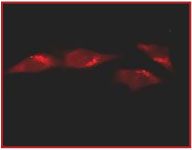
Anti-p53
Mouse Monoclonal Antibody
Catalog No. P05-60M
| Catalog No. | Pack Size | Price (USD) | |
|---|---|---|---|
| P05-60M-100 | 100 ug | $675 | |
| P05-60M-BULK | BULK | Contact Us |

Mouse Monoclonal Antibody
Catalog No. P05-60M
| Catalog No. | Pack Size | Price (USD) | |
|---|---|---|---|
| P05-60M-100 | 100 ug | $675 | |
| P05-60M-BULK | BULK | Contact Us |
Overview:
p53 is a key regulator of cell growth and acts as a tumor suppressor gene. Wild-type p53 gene can suppress transformation of rat embryo fibroblasts in cell culture by other oncogenes such as the adenovirus E1A and Ras (1). DNA tumor viruses such as SV40 large T antigen and the adenovirus E1A plus E1B-55Kd proteins bind to p53 and inactivate its tumor suppressor activities leading to cellular transformation. Mutational inactivation of the p53 gene is detected in more than 50% of human cancers. Mutation of p53 renders cancer cells more resistant to current cancer therapies due to lack of p53-mediated apoptosis (2).
References:
1. Levine, A J. et al.: Tumor suppressor genes: the p53 and retinoblastoma sensitivity genes and gene products. Biochim Biophys Acta. 1990: 1032(1); 119-36.
2. Sun, Y.: p53 and its downstream proteins as molecular targets of cancer. Mol Carcinog. 2006: 45(6); 409-15.
Specificity:
Recognizes the p53 protein in human tissues and cell lines
Cross Reactivity:
Human
Host Isotype / Clone#:
Mouse, IgG2a
Immunogen:
The antibody was produced against recombinant human p53 peptide
Purification:
Protein A chromatography
Stability:
1yr at –20oC from date of shipment
Sample Data:
Immunofluorescence microscopy of HeLa cells using Anti-p53 (1:100 dilution).

|
Sample Data:
Western blotting using Anti-p53 (1:1,500). HeLa whole cell lysate (lane 1), cytosol fraction (lane 2) and nuclear extract (lane 3) (15 µg)

|
![]() A. Hilton Benjamin et al., ATR Plays a Direct Antiapoptotic Role at Mitochondria, which Is Regulated by Prolyl Isomerase Pin1 Molecular Cell October 2015 10.1016/j.molcel.2015.08.008
A. Hilton Benjamin et al., ATR Plays a Direct Antiapoptotic Role at Mitochondria, which Is Regulated by Prolyl Isomerase Pin1 Molecular Cell October 2015 10.1016/j.molcel.2015.08.008
![]() Ling Chau Jenny Fung et al., A crucial role for bone morphogenetic protein-Smad1 signalling in the DNA damage response Nature Communications May 2012 10.1038/ncomms1832
Ling Chau Jenny Fung et al., A crucial role for bone morphogenetic protein-Smad1 signalling in the DNA damage response Nature Communications May 2012 10.1038/ncomms1832
![]() Li Q et al., Genetic analysis of p53 nuclear importation Oncogene December 2007 10.1038/sj.onc.1210597
Li Q et al., Genetic analysis of p53 nuclear importation Oncogene December 2007 10.1038/sj.onc.1210597
![]() Graczyk Agnieszka et al., S100A6 Competes with the TAZ2 Domain of p300 for Binding to p53 and Attenuates p53 Acetylation Journal of Molecular Biology September 2013 10.1016/j.jmb.2013.06.007
Graczyk Agnieszka et al., S100A6 Competes with the TAZ2 Domain of p300 for Binding to p53 and Attenuates p53 Acetylation Journal of Molecular Biology September 2013 10.1016/j.jmb.2013.06.007
![]() Chen Dongshi et al., TAp73 promotes cell survival upon genotoxic stress by inhibiting p53 activity Oncotarget September 2014 10.18632/oncotarget.2440
Chen Dongshi et al., TAp73 promotes cell survival upon genotoxic stress by inhibiting p53 activity Oncotarget September 2014 10.18632/oncotarget.2440
![]() S Mondal et al., A bioluminescent assay for monitoring conjugation of ubiquitin and ubiquitin-like proteins. Analytical Biochemistry October 2016 10.1016/j.ab.2016.06.016
S Mondal et al., A bioluminescent assay for monitoring conjugation of ubiquitin and ubiquitin-like proteins. Analytical Biochemistry October 2016 10.1016/j.ab.2016.06.016
Apoptosis/Autophagy, Cancer, Cardiovascular Disease, Cell Cycle, Cellular Stress, Inflammation, JNK/SAPK Pathway, Metabolic Disorder, Neurobiology, p38 Pathway
STAY CONNECTED
Fax: 1-604-232-4601